- Getting around Lijiang. Dont stay in the Old Towns more than 2 days, there is nothing to do. KRISS Oct 9, 2013 05:46
- 2013 Beijing Temple Fair BENNYLAU Feb 26, 2013 03:29
- Malaysian traveling from KUL - LAX vis Shanghai PVG ZATI_DY Jan 3, 2013 20:15
Lost in Langde
- Views: 4770
- |Vote: 2 0
- |Add to Favorites
- |Recommend to Friends
Lost time
We were looking forward to ‘camping out’ – not in the true sense of the word of course since camping is not yet a popular recreational pastime in China. However China does offer a very special Clayton’s camping. Staying in the homes of some of China’s fascinating minorities is the best way to experience their lifestyle and their culture. ‘Roughing it’ in a Miao family farmhouse with no plumbing, shower or indoor toilet has all the appeal of camping out but without the hassle of packing and carrying all that camping gear.
The Miao, one of the best known and diverse in culture can be found throughout the southern provinces of China. Their wide distribution has resulted in significant differences in names, clothes and dialect and Miao people from different areas sometimes have great difficulty in communicating with each other. They speak three distinct dialects of their own and often that of other ethnic groups with whom they live amongst. While their art and festivals may differ between areas they generally all celebrate the Lusheng Festival. These are often held in different villages on different days giving ample opportunity for visitors to witness these little known customs in sometimes very isolated villages.
By 9.00am we were ready to check out of the hotel in Kaili but before we could leave my friend had a surprise for us. She had made contact with two of our colleagues from school. Simon, an IT teacher, a quiet sensitive young man with a really great singing voice is my Chinese ‘sons’ best friend and I was happy to see him again. He Laoshi, an older gentleman, a math teacher with whom I once shared a staff room at school is a man who loves to talk. They came to take us for breakfast and show us around their hometown on our second morning.
After breakfast we visited the new stadium built in the traditional architectural style of the ‘Wind and Rain Bridges’ of the Miao and Dong ethnic groups which often share similar customs. A replica drum and drum tower stand outside with a couple of bronze bull sculptures. After sightseeing we planned to leave for our ‘camp out’ in the village. But in typical fashion, our plans were being hijacked and we were totally unaware as Simon spoke very little English and He Laoshi spoke none at all.
He Laoshi now wanted to treat us to lunch – it seemed to matter little that it was only 11.00am, we had barely finished breakfast and were not in the least bit hungry. It was only now in the restaurant that the full plans were revealed to us. Simon, He Laoshi and his son would also ‘camp out’ in the village with us. This would be a first for all of them too and I can’t help wondering if they would ever have done something like this if we had not been doing it.
The staff, in local dress greeted us in typical Miao fashion while we waited for our lunch to arrive. It is customary when guests arrive in a village they must partake of the villages wine, usually three sips offered by the hands of the hosts and sometimes served from a cow horn as ours was this day and accompanied by the playing of the Lusheng. With lunch over we finally we got permission to leave for the night.
Lost luggage
Now a party of seven we needed two taxis for transport. With our in the boot of our taxi and the girls bags in the back of the other taxi we were finally off. Langde Shang or Upper Langde is about thirty minutes south of Kaili near Leishan and not far from where we had spent the day before. It is a small village which sees a few tourist groups but few stay overnight. The local bus from Kaili stops at Lower Lengde village and it is just a short walk up the valley.
Just after turning off to the village I thought I saw He Laoshi on the back of a motor bike heading back to town. As we rounded the last bend in the road our attention was caught by the new Wind and Rain Bridge over the creek, the old water wheel and Upper Langde stretching up the slope to our left. The two girls stood with Simon beside the road waiting for us. There was no sign of He Laoshi – that was him on the motor bike chasing their taxi back to town with the girls back packs including all their money and ID cards. It was just after one o’clock and we would not see He Laoshi again until seven that evening.
While we discussed the dilemma, the last of a group of four tour buses made their way up into the village running the gauntlet of the guest greeting party the with the obligatory wine sipping all the way up into the village. We wandered down to the creek to inspect the large water wheel on the opposite bank still used to raise water to the rice terraces meters above the creek. It was hot and there seemed little point in waiting down on the road in the hot sun until He Laoshi returned with the girls bags. We slipped into the village almost unnoticed but sadly missed the traditional greeting. Up by the gate we were met by a few older women who were keen to host us for the night.
A Miao home is constructed entirely of untreated timber and tiles or thatch and is surprisingly spacious. Most villages are built on slopes and houses are often two or three floors and supported on stilts. The lower floor is used for housing animals and produce. The ground or middle floor is the family living area and the upper floor is for sleeping and more storage. All houses have a veranda out front with a bench inside the railing and bamboo poles for hanging out the washing.
The typical Miao family is small and monogamous and aged parents are normally supported by their youngest son. Marriages are usually arranged by parents, but young unmarried men and women are free to court. It is customary to hold mass courting during holidays, when young women from a host village gather to sing antiphonal love songs with young men from neighbouring villages. Love tokens are exchanged by youngsters who are attracted to each other but they must still have the approval of their parents before they can marry.
We chose a home on the edge of the village high up the hill with a great view and a patio outside the kitchen. With a communal tap and toilets just outside this was very comfortable accommodation for the night. The house was joined to several others on the same level by a veranda running the full length of them. The first room was the large kitchen, with two huge woks sitting over the fireplace on the back wall. In the middle of the room were stairs leading to the upstairs bedrooms. Next to the kitchen was the sparse living room with the small black and white television on a cabinet, a small hearth in the centre to keep it warm in winter. Another door opened on this level to a large dining room dominated by a wall poster of Chairman Mao and other certificates of merit. The only furnishings were two small tables and some benches which could be moved outside onto the spacious veranda. Behind the living room was the master bedroom.
On the upper floor of the house were four rooms, three bedrooms, where their four children once slept. We chose the front room which overlooked the village and the valley through a small dormer window. We were informed by our host about the protocol of men and women under the same roof. Men and women were not expected to share the same rooms let alone the same bed while in the Miao home. While this was not an issue for any of us I wondered what couples travelling together would make of it. After settling into our simply furnished room we made our way down to the square just as another group of tourist were ushered into the village by the elders playing the lusheng.
Ladies young and old were quickly donning their traditional skirts and headwear, ready to dance on the stone inlaid square while the men played lushengs ranging in size from quite short to over three meters in length. The lusheng is a free-reed mouth organ played by Dong, Miao and other related minority peoples of South-western China. The traditional lusheng had six bamboo pipes that were set into a bamboo or wooden wind chamber. According to Miao legend, playing the lusheng during the festival period virtually guarantees rainfall which is a critical element in the life of any farming community. Guizhou is known for its inclement weather and hardly a day passes without the haunting sounds of the lusheng lilting up a valley somewhere. One has to wonder if there is any connection with this old pipe myth and the fact that there are seldom more that three consecutive days of sunshine in the province.
After the performance the women moved off amongst the guests with their baskets full of crafts for sale. Almost all the villagers both young and old turn out to watch the spectacle. Many of them dress for the occasion even if they are not actually performing. In the past I like many of my friends have made the naïve statement that ‘all Chinese look alike’ but this is such a misconception. I sat mesmerized by the beauty and variety of features present in just one small village.
Lost luxury
After the show my friend and I donned our swim suits and went in search of a water hole large enough to swim in. It should have been easy but late in the afternoon most were already occupied by the farmer’s prize possessions, the buffalo. We crossed the creek beneath the village and sat on the bank waiting for one to empty. A group of young boys fished a little further upstream, casting their net about, but caught nothing.
Following a refreshing dip where the water buffalo had recently wallowed we strolled upstream through the rice paddies with the slow rhythmic creak of the water wheels drawing us on. Up the slope beyond the farmhouses and round the bend in the river we continued, being overtaken by farmers returning home. Several of them invited us home for a meal, one older women slowed to keep pace and chat with us. We had a passable conversation in broken Mandarin and when it came time for us to head back she showed us where to find path which would take us down and across the creek again.
Back below the village some of the women had stripped to their knickers and sat discreetly in the water washing themselves right beside their menfolk who were busy washing the buffalo down. We had a quick chat with one talkative guy. He Laoshi had phoned and was on his way back after successfully tracking down the bags. On his return he spent some time recounting the story of how he had tracked down the taxi with the help of a friend - the local police superintendent. We sat about snacking, chatting and playing cards for a while longer before asking our hosts to prepare a meal for us. This was a simple affair of fish and vegetables cooked over a wood stove and a little rice wine for the already talkative He Laoshi who got even chattier after dinner.
I had bought some bottled water from the village store on the way up from the creek and promised the old man I would return later to pay him. It was dark when I made my way back to the square and he had closed up for the night but I found another old couple sitting in the square with a torch who called him out for me. I bought a couple of ice creams and thanked him for trusting me. The old gentlemen shone his torch across the square providing me with enough light to see my way back to the alley below our house. It was very dark that night. With little water pressure remaining in the communal tap outside our kitchen we cleaned our teeth out on the patio using bottled water, made one last trip to the ‘out house’ with the torch before making our way upstairs to bed.
The rest of the group changed and made their way by torchlight down to the creek to bath under cover of darkness like the villagers have always done. The temperature drops a little in the mountains after nightfall so I was glad that we had taken our bath earlier in the afternoon. While there was no tent and sleeping bags, neither was there running water, showers or flush toilets but we were happy to lose these luxuries in Upper Langde. It’s a great way to experience the lifestyle and customs of the majority of China’s rural population.



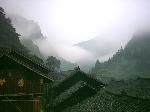
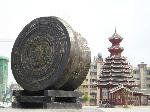
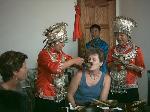
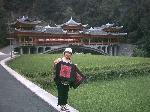
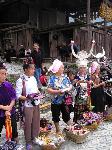
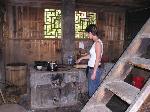
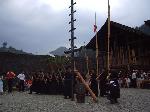
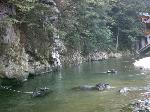
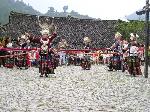
 Copyright © 1998-2026 All rights reserved.
Copyright © 1998-2026 All rights reserved.